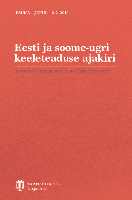
Eesti ja Soome-Ugri Keeleteaduse Ajakiri-Journal of Estonian and Finno-Ugric Linguistics
metrics 2024
Bridging Academic Excellence in Language Studies
Introduction
Eesti ja Soome-Ugri Keeleteaduse Ajakiri - Journal of Estonian and Finno-Ugric Linguistics is a premier academic journal published by UNIV TARTU PRESS, dedicated to advancing the field of linguistics with a particular focus on the Estonian and Finno-Ugric languages. Since its inception, the journal has embraced an Open Access publishing model, allowing researchers and enthusiasts to freely explore its groundbreaking studies and findings since 2013. With an Impact Factor that places it in the Q3 quartile of leading journals within the linguistic domain, it serves as a vital platform for the dissemination of new research and theoretical advancements. Ranked 410th out of 1088 journals in the Arts and Humanities category for Language and Linguistics, it reflects a robust commitment to quality scholarship that appeals to academics, professionals, and students alike. Operating from Tartu, Estonia, the journal aims to foster greater understanding and appreciation of the Estonian language within the broader context of Finno-Ugric studies, making it an essential resource for anyone interested in these unique linguistic cultures.
Metrics 2024
 0.12
0.12 0.30
0.30 0.20
0.20 9
9Metrics History
Rank 2024
Scopus
JCI (Web Of Science)
Quartile History
Similar Journals
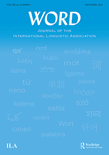
WORD-JOURNAL OF THE INTERNATIONAL LINGUISTIC ASSOCIATION
Exploring the depths of language and its complexities.WORD-JOURNAL OF THE INTERNATIONAL LINGUISTIC ASSOCIATION is a leading peer-reviewed journal dedicated to advancing the field of linguistics and language studies. Published by Routledge Journals, Taylor & Francis Ltd, this esteemed journal has earned a reputation for its rigorous scholarship, reflected in its 2023 Q2 ranking in Linguistics and Language and its solid performance in Scopus Ranks. Encompassing a wide range of topics—from theoretical frameworks to empirical research—WORD serves as an essential resource for linguistics researchers, educators, and students alike. While currently not operating under an open access model, the journal is committed to providing high-quality, impactful research articles that contribute significantly to the linguistic community. With its convergence periods from 1998 to 2009 and 2015 to 2024, WORD continuously fosters the discourse of language studies, ensuring that critical insights and discussions are accessible for ongoing academic exploration.

Language and Linguistics
Exploring the Frontiers of Language and ThoughtLanguage and Linguistics is a leading academic journal published by ACAD SINICA, INST LINGUISTICS, based in Taiwan. Established in 2008, this journal has rapidly gained recognition within the field of linguistics, achieving a commendable ranking of Q2 in the 2023 category quartiles and holding positions in the top percentiles of Scopus rankings for both Arts and Humanities and Social Sciences. With an ISSN of 1606-822X and an E-ISSN of 2309-5067, the journal aims to foster the development of linguistics research by providing a platform for the dissemination of innovative and interdisciplinary studies. While it currently operates on a traditional subscription model, its significant contribution to the advancement of linguistic theory and its applications makes it an invaluable resource for researchers, professionals, and students alike. Spanning converged years from 2008 to 2024, Language and Linguistics continues to shape the dialogue in understanding language phenomena and encourages submissions that push the boundaries of current linguistic knowledge.

Mandenkan-Bulletin Semestriel d Etudes Linguistiques Mande
Exploring the Depths of Mande LinguisticsMandenkan-Bulletin Semestriel d'Etudes Linguistiques Mande is an esteemed academic journal dedicated to the exploration of Mande languages and linguistics, published by the Centre National de Recherche Scientifique in France. With its ISSN 0752-5443, this journal has established itself within the linguistic community, holding a notable Q3 ranking in both the Linguistics and Language category as well as respectable standings in Scopus ranks, placing it in the 55th percentile for language and linguistics. Since its inception in 2018, it has been pivotal in publishing groundbreaking research that advances our understanding of the Mande language family and its cultural implications. Although currently not open access, the journal offers a wealth of knowledge fostered through rigorous peer-reviewed articles aimed at linguists, researchers, and students alike, making significant contributions to the fields of linguistics and African studies.

Slovo a Slovesnost
Empowering Linguistic Scholarship for a Global AudienceSlovo a Slovesnost is a prominent academic journal dedicated to the field of linguistics and language studies, published by the Czech Language Institute of the Czech Academy of Sciences. With an ISSN of 0037-7031, the journal has established itself as a significant resource for researchers and professionals within the linguistic community. Its rigorous selection process and impactful contributions have earned it a commendable Q2 ranking in Linguistics and Language as of 2023, as well as Scopus rankings in the 58th percentile for Language and Linguistics. Offering insights into both theoretical and applied linguistics, Slovo a Slovesnost serves as an essential platform for cutting-edge research, fostering dialogue among scholars, and enriching the study of language within the Czech Republic and beyond. Although it does not provide open access, the journal supports a subscription model that ensures high-quality dissemination of knowledge to a dedicated audience of linguists, educators, and linguistic scholars. With coverage converging from 2004 to 2024, it continues to thrive as a vital corner of linguistic scholarship.
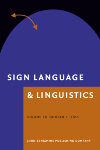
Sign Language & Linguistics
Celebrating Two Decades of Linguistic ExcellenceSign Language & Linguistics is an esteemed academic journal published by John Benjamins Publishing Co, dedicated to advancing the field of sign language studies and linguistics. With an ISSN of 1387-9316 and an E-ISSN of 1569-996X, this journal has earned a prominent place in the linguistic community, achieving a Q1 ranking in both the Linguistics and Language category, and standing out within the Scopus rankings, placing in the 77th percentile among the Arts and Humanities and 75th percentile in the Social Sciences categories. Sign Language & Linguistics spans over two decades of research, offering comprehensive insights and analyses from 1998 to 2024, promoting high-quality scholarly communication. Aimed at researchers, professionals, and students alike, this journal is essential for those exploring the intersection of sign languages, linguistics, and cultural studies, facilitating progressive discourse and fostering an understanding of this vital mode of human communication.
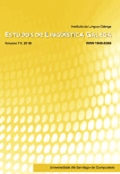
Estudos de Linguistica Galega
Unveiling the Nuances of Galician LinguisticsEstudos de Linguistica Galega, an esteemed journal published by the University of Santiago de Compostela, provides a critical platform for scholars engaged in the vibrant field of linguistics, particularly focusing on the Galician language and its surrounding linguistic phenomena. Launched in 2009, this Open Access journal enables unrestricted dissemination of research, facilitating engagement from a global audience. With an impact factor that positions it within the Q4 quartile in Linguistics and Language, it reveals a strong commitment to advancing the discourse in this niche. It ranks #691 out of 1088 in the Arts and Humanities category, underscoring its relevance in the academic landscape. The journal aims to foster collaboration and innovation among researchers and practitioners, making significant contributions to understanding linguistic diversity and its implications in contemporary society. Located in Santiago de Compostela, Spain, the journal encourages submissions that explore theoretical, empirical, and applied linguistic studies, thereby inviting researchers, professionals, and students to contribute to this growing field.

Journal of Slavic Linguistics
Unlocking the Nuances of Slavic SpeechJournal of Slavic Linguistics, published by SLAVICA PUBLISHERS, is a key academic resource dedicated to the exploration of Slavic languages and linguistics. Established to provide a comprehensive platform for scholarly research, this journal addresses the intricate dynamics of Slavic phonetics, syntax, semantics, and discourse, making significant contributions to both theoretical and applied linguistics. The journal holds an impact factor that reflects its value in the linguistic community, particularly as it is ranked in the Q4 category in Linguistics and Language for 2023. With a focus on a wide range of topics within the field, the Journal of Slavic Linguistics serves as an essential reference for researchers, educators, and students alike, fostering an appreciation and deeper understanding of Slavic linguistic phenomena. Although currently not an Open Access journal, it remains accessible to a broad audience keen on engaging with contemporary linguistic scholarship.

Turkic Languages
Connecting Scholars Through Turkic Linguistic ResearchTurkic Languages is an esteemed academic journal published by HARRASSOWITZ VERLAG, dedicated to the exploration and analysis of Turkic languages within the broader fields of linguistics and language studies. With an ISSN of 1431-4983, this journal serves as a vital platform for researchers, professionals, and students interested in the intricate structures, dynamics, and cultural contexts of Turkic languages. Although it currently operates without an Open Access option, the journal's commitment to quality research is evident in its placement within the Q4 category of Linguistics and Language for 2023, alongside its Scopus rankings where it stands in the 30th and 26th percentiles for Language and Linguistics across Arts and Humanities and Social Sciences, respectively. The journal's scope encompasses a variety of linguistic phenomena, striving to foster a deeper understanding of Turkic languages and their significance in the global linguistic landscape. With converged years from 2017 to 2022, Turkic Languages continues to uphold its reputation as a crucial resource for advancing scholarship in this specialized field.

Studi e Saggi Linguistici
Connecting Scholars in the Evolving World of LinguisticsStudi e Saggi Linguistici is a distinguished academic journal published by EDIZIONI ETS, based in Pisa, Italy. With its ISSN 0085-6827, this journal has established itself as a vital resource in the field of linguistics, particularly noted for its contributions since its inception in 2016. Although currently categorized in the lower quartile (Q4) by the 2023 metrics in the domains of Linguistics and Language within Scopus, it remains a significant platform for innovative research and critical discussions surrounding language studies. Focusing on both theoretical and practical aspects of linguistics, the journal serves as a nexus for scholars and practitioners alike, facilitating a rich interchange of ideas and knowledge in a rapidly evolving discipline. As an invaluable publication for researchers, professionals, and students, Studi e Saggi Linguistici is committed to advancing the understanding of linguistic phenomena and fostering scholarly communication in its field.
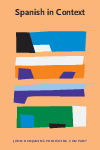
Spanish in Context
Navigating the Depths of Spanish Contextual StudiesSpanish in Context, published by John Benjamins Publishing Co, is a leading journal in the field of linguistics and literature, focusing on the contexts and uses of the Spanish language. With an ISSN of 1571-0718 and an E-ISSN of 1571-0726, this reputable journal has established itself as an essential resource for researchers, professionals, and students alike since its inception in 2004. The journal enjoys a strong presence in academic discourse, holding a prestigious Q2 category ranking in Linguistics and Language, and an esteemed Q1 ranking in Literature and Literary Theory for the year 2023. Furthermore, its contributions to the field are underscored by impressive Scopus rankings: it occupies the 40th position in the Arts and Humanities category for Literature and Literary Theory, representing the top 96th percentile. With an ongoing commitment to advancing scholarship and understanding of Spanish in various contexts until 2024, the journal welcomes original research articles, reviews, and critical essays that delve into linguistic innovations and literary trends. By fostering a dynamic dialogue among academics and practitioners, Spanish in Context plays a vital role in enhancing the visibility and relevance of Spanish studies on a global scale.